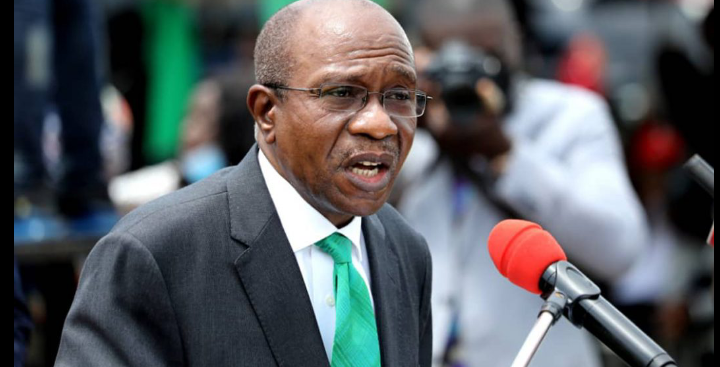Justice Tsoho kicks as SSS files motion to arrest Emefiele for terrorism financing, economic sabotage

The judge said the SSS did not supply evidence indicating President Muhammadu Buhari’s approval before filing the salacious and uncorroborated allegations in court.
Justice John Tsoho of the Federal High Court has slammed the State Security Service for filing a motion to arrest CBN Governor Godwin Emefiele without following proper procedure.
Mr Tsoho in a December 13, 2022, ruling declined to authorise an arrest warrant sought by the SSS to take Mr Emefiele into custody, saying the secret police had failed to establish its claims against the head of the country’s central bank while also obscuring his identity in order to deceive the court into granting an erroneous motion.
“The entire affidavit depositions….purport that preliminary investigation has revealed various acts of terrorism financing, fraudulent activities perpetrated by the respondent and his involvement in economic crimes of national security dimension,” the head of the Nigerian Federal High Court system said while ruling on the application filed ex-parte on December 9. “These are no doubt grave allegations, but which the applicant has not presented any concrete evidence to support.”
The judge said the SSS did not supply evidence indicating President Muhammadu Buhari’s approval before filing the salacious and uncorroborated allegations in court.
“The respondent in this application is named as “Godwin Emefiele” without disclosure of his status or position anywhere; not even in the affidavit.
“It is left to speculation if the “Godwin Emefiele” is the same person as the serving Governor of the Central Bank of Nigeria. If it is, then he is unarguably a high ranking public official in Nigeria and indeed occupies a sensitive position as one of key drivers of the nation’s economy.
“Therefore, an application of this kind should have evidence of the approval of the respondent’s boss, that such measures are authorised to be taken.
“It therefore seems that the applicant intends to use the court as a cover for an irregular procedure, which is unacceptable.
“In the light of the foregoing reasons, I decline to grant this application ex-parte,” Mr Tsoho said in the judgment seen by Peoples Gazette on Monday night.
The judge said the SSS has the power to arrest and detain Mr Emefiele without a warrant, but the secret police appeared desperate to get judicial approval because it lacked any serious evidence to move after the CBN governor.
A spokesman for the SSS did not immediately return a request seeking comments. The CBN declined comments on Monday night.
The court order surfaced hours after civic groups protested in Abuja, saying they had caught wind of an attempt to arrest Mr Emefiele on allegations of terrorism and economic crimes. The groups warned that such a move by the SSS could devastate the nation’s economy, saying he had done well since his appointment in 2014.
Mr Emefiele has come under criticism for his involvement in political activities despite being barred by federal laws against partisan politics as the central bank chief. He made moves to seek presidential nomination earlier this year, but backed down after the president ordered all federal officials with political ambitions to step down from office.
But people familiar with the matter told The Gazette on Monday night that Mr Emefiele became a target of the SSS after politicians prevailed on the secret police to act quickly to curtail the CBN boss for changing major national currencies weeks to 2023 general elections.
Politicians nationwide were said to have stockpiled cash which they intended to deploy for voter inducement. But with Mr Emefiele’s decision to phase out major currencies in circulation by January 31, 2022, politicians will find it more difficult to successfully find the cash to bribe voters at the ballot box.
Mr Emefiele was widely criticised when he introduced the policy in October, and followed it with another controversial measure that sought to limit cash withdrawals to N100, 000 per week for Nigerians.
The CBN said more than 80 percent of the country’s currency in circulation could not be traced, but critics said the move was an attempt to loot public funds through contract awards for printing new notes.
Mr Emefiele denied the allegations, saying monitoring currency in circulation and limiting cash withdrawals would bolster the country’s economy because most transactions would be conducted through electronic channels that would make them traceable and taxable.












